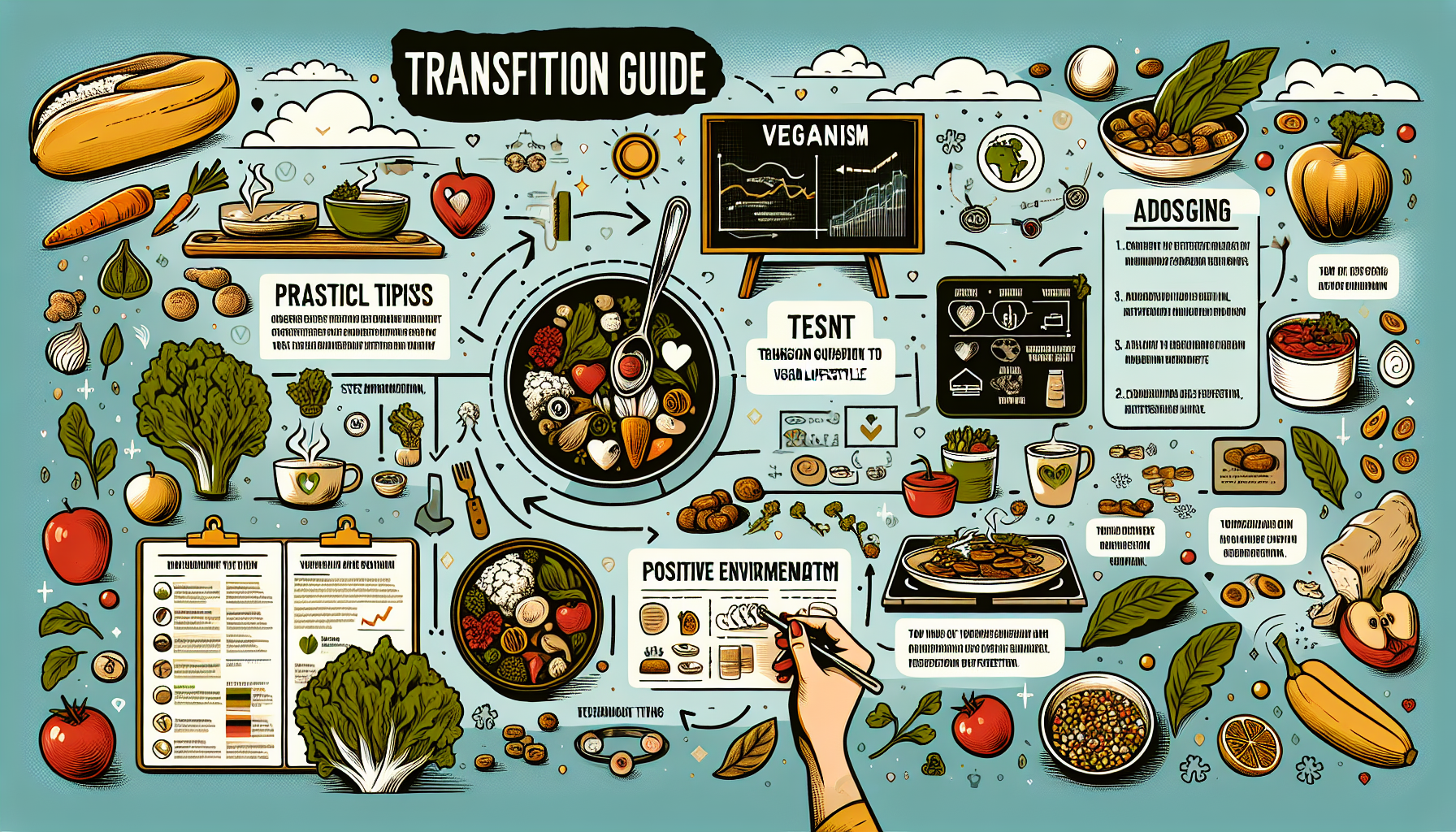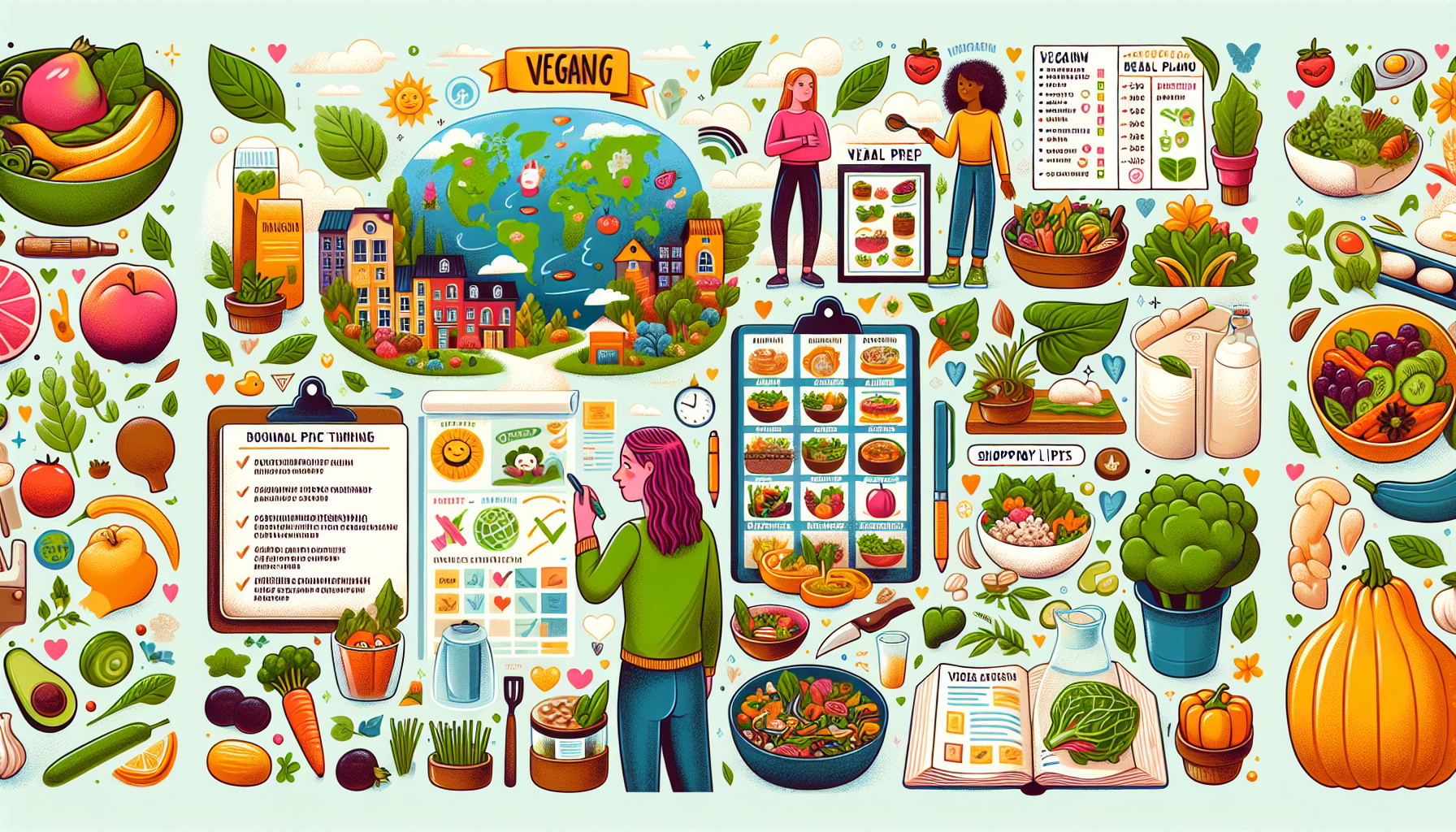So you’ve decided to embark on a journey towards a vegan lifestyle, but you’re not quite sure where to start or how to make the transition seamless? Look no further! In this article, we will guide you through the essential steps and offer practical tips on how to adopt a vegan lifestyle, helping you make conscious choices that align with your values and contribute to a more compassionate world. So grab a plant-based snack and get ready to explore the incredible benefits and straightforward methods of embracing a vegan way of life.
Table of Contents
Understanding the Vegan Lifestyle
What is a Vegan?
Being vegan means adopting a lifestyle that avoids the use of animal products for food, clothing, cosmetics, and other purposes. It involves consuming plant-based foods and products made without any involvement or harm to animals. Vegans prioritize the well-being of animals, the environment, and their own health by embracing a compassionate and sustainable lifestyle.
Benefits of Veganism
There are numerous benefits associated with adopting a vegan lifestyle. Firstly, it promotes animal rights and prevents cruelty towards animals, aligning with the principles of compassion and empathy. Secondly, veganism can contribute to better personal health by reducing the risk of heart disease, high blood pressure, and certain types of cancer. It has been shown to aid in weight management, improve digestion, and provide a wide range of essential nutrients. Furthermore, veganism is environmentally friendly as it helps reduce greenhouse gas emissions, deforestation, and water usage associated with animal agriculture.
Common Myths and Misconceptions
There are several common myths and misconceptions surrounding veganism. One prevalent misconception is that vegans lack essential nutrients such as protein, iron, and calcium. However, with proper planning and understanding of plant-based nutrition, it is entirely possible to obtain all the necessary nutrients from a vegan diet. Another common misconception is that veganism is too expensive. While certain vegan products may be pricier, a well-balanced vegan diet can actually be more economical and cost-effective.
Transitioning to a Vegan Lifestyle
Setting Your Motivation
Before embarking on a vegan lifestyle, it is essential to identify and understand your motivation. Whether it is a desire to protect animal welfare, the environment, or to improve your health, having a clear reason will help you stay committed during the transition.
Gradual or Immediate Transition
Deciding whether to transition gradually or make an immediate change to a vegan lifestyle is a personal choice. Gradual transition involves gradually eliminating animal products from your diet and lifestyle over time. This approach allows for a smoother adjustment both physically and mentally. On the other hand, some individuals prefer an immediate shift, which requires more dedication and discipline but can lead to quicker results.
Educating Yourself about Nutrition
Gaining knowledge about plant-based nutrition is crucial to ensure you meet your dietary needs properly. Educate yourself on plant-based protein sources, essential vitamins and minerals, and ways to incorporate healthy fats into your meals. By becoming well-informed, you can confidently build a balanced vegan diet.

Building a Balanced Vegan Diet
Essential Nutrients to Consider
It is important to pay attention to certain nutrients when adopting a vegan lifestyle. These include protein, iron, calcium, vitamin B12, omega-3 fatty acids, and vitamin D. While these nutrients can be obtained from plant-based sources, it may be necessary to supplement some of them to meet recommended levels.
Plant-Based Protein Sources
Protein is an essential macronutrient for the body, and fortunately, there are numerous plant-based sources of protein. Legumes, such as beans, lentils, and chickpeas, are excellent protein sources. Other options include tofu, tempeh, seitan, quinoa, nuts, seeds, and whole grains. Incorporating a variety of these protein-rich foods into your diet will ensure you are meeting your protein needs.
Incorporating Healthy Fats
Healthy fats play a crucial role in maintaining good health. Include sources of monounsaturated and polyunsaturated fats in your vegan diet, such as avocados, nuts, seeds, and plant-based oils like olive oil and coconut oil. These fats provide essential fatty acids and help absorb fat-soluble vitamins.
Getting Sufficient Vitamins and Minerals
While plant-based diets are rich in vitamins and minerals, there are a few nutrients that require extra attention for vegans. Vitamin B12, which is mainly found in animal products, may need to be supplemented, as it is essential for nerve function and the formation of red blood cells. Additionally, ensuring sufficient intake of calcium, iron, iodine, and vitamin D is crucial for overall health. These nutrients can be found in various plant-based sources or through supplements.
Stocking Your Vegan Pantry
Replacing Animal-Based Ingredients
When transitioning to a vegan lifestyle, it is important to find suitable replacements for animal-based ingredients. Replace dairy milk with plant-based alternatives such as almond milk, soy milk, or oat milk. Eggs can be replaced with chia seeds or flaxseeds mixed with water. There are also various vegan substitutes available for cheese, yogurt, and meat products.
Essential Pantry Staples
Stocking your pantry with essential vegan ingredients is key to easy and convenient meal preparation. Some staples to keep on hand include whole grains, such as quinoa and brown rice, legumes, canned beans, nuts and seeds, plant-based milk, tofu, tempeh, and a variety of spices and herbs for flavor.
Discovering New Ingredients
Transitioning to a vegan lifestyle opens up a world of new and exciting ingredients. Experiment with different plant-based foods such as jackfruit, nutritional yeast, miso paste, tahini, and coconut aminos. Embrace the adventure of trying new flavors and textures to keep your vegan meals interesting and enjoyable.
Reading Ingredient Labels
Becoming proficient at reading ingredient labels is crucial for vegans to ensure that no animal-derived ingredients are present. Familiarize yourself with common non-vegan ingredients, such as gelatin, whey, casein, and honey. Additionally, be aware of hidden animal products, such as animal-derived additives and certain food colorings.

Meal Planning and Preparation
Creating a Weekly Meal Plan
Meal planning is an essential tool for successfully adopting a vegan lifestyle. Plan your meals for the week, considering your nutritional needs and personal preferences. This helps ensure a well-balanced diet, reduces food waste, and saves time and effort in daily meal preparations.
Batch Cooking and Freezing
Simplify your meal preparation by utilizing batch cooking and freezing. Cook larger portions of meals and freeze individual servings for later use. This allows for quick and convenient meals, especially during busy days, eliminating the need to resort to non-vegan options due to time constraints.
Adapting Favorite Recipes
One of the joys of transitioning to a vegan lifestyle is discovering new ways to recreate your favorite recipes. Experiment with vegan substitutes for meat, dairy, and eggs in your beloved dishes. Veggie burgers, plant-based lasagna, and dairy-free desserts are just a few examples of the endless possibilities for adapting your favorite recipes.
Experimenting with Plant-Based Recipes
Embrace the creativity and diversity of the vegan diet by exploring plant-based recipes. There are countless online resources and cookbooks dedicated to vegan cooking. Experiment with different flavors, spices, and cooking methods to expand your culinary skills and find new favorite dishes.
Dealing with Social and Practical Challenges
Eating Out and Social Gatherings
Eating out and attending social gatherings as a vegan can sometimes be challenging, but it doesn’t have to be. Research vegan-friendly restaurants in your area and communicate your dietary preferences to friends and family when invited to social events. Check menus in advance and suggest vegan-friendly options or inquire if the restaurant can accommodate your needs.
Communicating Your Decision
When transitioning to a vegan lifestyle, it can be beneficial to communicate your decision with loved ones. Explain your motivation and the positive impacts it has on animals, the environment, and your health. Be open to answering questions and providing information to help them better understand your choices.
Addressing Nutritional Concerns
Some individuals may express concerns about the nutritional adequacy of a vegan diet. Familiarize yourself with facts, studies, and credible sources that support the benefits and nutritional viability of veganism. Share information about plant-based sources of essential nutrients and the scientific evidence behind the positive health outcomes associated with a well-balanced vegan diet.
Finding Vegan-Friendly Restaurants
Discovering vegan-friendly restaurants can significantly ease the challenges of eating out. Utilize online directories, social media groups, or vegan-specific apps to find restaurants that cater to vegan diets. These resources often provide reviews, menus, and helpful tips from other vegans, ensuring you can enjoy dining out while adhering to your vegan lifestyle.
Benefits and Challenges of Veganism
Health Benefits
Embracing a vegan lifestyle can bring about numerous health benefits. Studies have shown that vegans tend to have lower cholesterol levels, reduced risk of heart disease, improved digestion, and increased intake of fiber, vitamins, and minerals. Additionally, a well-planned vegan diet can aid in weight management and boost overall energy levels.
Environment and Sustainability
Veganism is not only beneficial for personal health but also for the health of the planet. Animal agriculture is a significant contributor to greenhouse gas emissions, deforestation, and water pollution. By choosing plant-based alternatives, vegans help reduce their carbon footprint, preserve natural resources, and promote a more sustainable future.
Ethical Considerations
For many vegans, ethical considerations are a primary driving force behind their lifestyle choice. By abstaining from animal products, they actively participate in reducing animal suffering and exploitation. Veganism aligns with principles of compassion, empathy, and respect for all living beings, promoting a more ethical and humane society.
Overcoming Challenges
Transitioning to a vegan lifestyle may come with its fair share of challenges. It is important to remember that everyone’s journey is unique, and setbacks or slip-ups may happen. Rather than dwelling on perfection, focus on progress. Continually educate yourself, seek support from the vegan community, and maintain a positive mindset to overcome any challenges that may arise.
Vegan and Cruelty-Free Products
Cosmetics and Personal Care
Vegan-friendly and cruelty-free cosmetics and personal care products are becoming increasingly accessible. Avoid products containing animal-derived ingredients like lanolin, carmine, and beeswax. Look for certifications such as the Leaping Bunny or Vegan Society logos to ensure the product is truly cruelty-free.
Household Cleaning Products
Household cleaning products can also contain animal-derived ingredients or be tested on animals. Look for plant-based, cruelty-free alternatives that effectively clean your home without harming animals or the environment. Numerous eco-friendly brands offer a wide range of cleaning products suitable for a vegan lifestyle.
Sustainable Fashion
Vegans prioritize not only what they consume but also what they wear. Sustainable fashion options are growing, providing vegan-friendly alternatives to animal-based materials like leather, fur, and silk. Explore brands offering plant-based fabrics such as organic cotton, hemp, and innovative alternatives like pineapple leather and mushroom-based leather substitutes.
Getting Support and Connecting with the Vegan Community
Joining Online Vegan Communities
The internet offers a wealth of resources and opportunities to connect with like-minded individuals. Join online vegan communities, forums, and social media groups to learn from experienced vegans, share your own experiences, and find support when navigating the challenges and joys of veganism.
Attending Vegan Events and Meetups
Attending vegan events and meetups allows you to connect with the local vegan community and expand your knowledge. Look for vegan festivals, cooking classes, or animal rights workshops in your area. These events provide a platform for networking and discovering new aspects of the vegan lifestyle.
Engaging with Local Animal Rights Organizations
Partnering with local animal rights organizations can have a significant impact on promoting veganism and supporting animal welfare initiatives. Volunteer your time, participate in fundraising events, or actively engage with advocacy campaigns. By connecting with these organizations, you can contribute to positive change within your community.
Maintaining a Long-Term Vegan Lifestyle
Continuing Education
Maintaining a long-term vegan lifestyle requires ongoing education and staying informed about the latest developments in plant-based nutrition, vegan products, and sustainability efforts. Continue to explore new recipes, read books, attend workshops, and follow trusted vegan influencers to expand your knowledge and strengthen your commitment.
Navigating Challenges and Temptations
As with any lifestyle change, challenges and temptations may arise along the way. Stay focused on your motivations, remind yourself of the positive impacts veganism has on your health, animals, and the environment. Seek support from the vegan community, practice self-care techniques, and find alternative options in challenging situations to stay true to your commitment.
Sharing your Experience
Sharing your personal journey and experiences can have a profound impact on inspiring others to adopt a vegan lifestyle. Share your recipes, tips, and the positive changes you have experienced with friends, family, or through your online platforms. By speaking openly and passionately about your vegan lifestyle, you can potentially influence others to make compassionate, sustainable choices.
Inspiring Others to Go Vegan
Becoming an advocate for the vegan lifestyle is a powerful way to inspire positive change in others. Help dispel common myths, provide resources and information, and lead by example. Engage in respectful conversations, encourage others to explore veganism, and highlight the benefits it offers to animals, the environment, and personal health.
By understanding the vegan lifestyle, transitioning thoughtfully, building a balanced vegan diet, stocking your pantry with suitable ingredients, meal planning, and dealing with challenges, you can embark on a fulfilling and sustainable vegan journey. Embrace the benefits, find support, and become an advocate for a compassionate lifestyle that positively impacts animals, the planet, and your own well-being.






